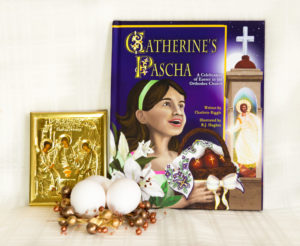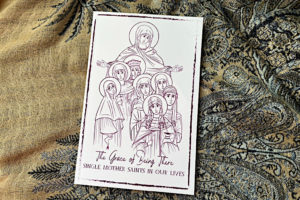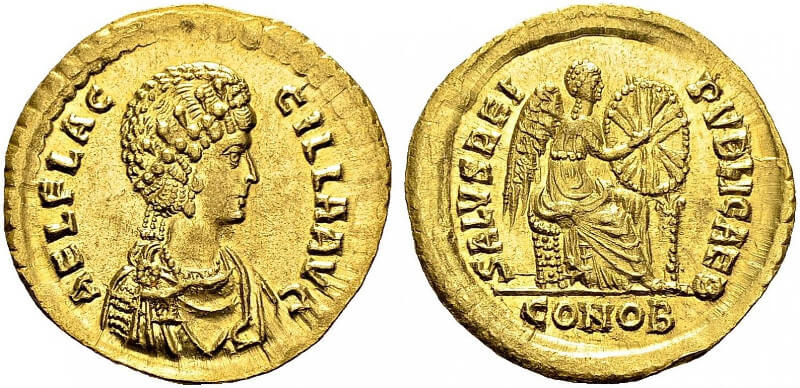St. Placilla’s feast day is September 14. September 14 also the Feast of the Exaltation of the Cross, which is undoubtedly why you’ve never heard of St. Placilla. When a saint’s day falls on one of the Twelve Great Feasts, the saint disappears.
And I think St. Placilla would be pleased to be overlooked in this way, to disappear into the Cross.
St. Placilla (also known as Aelia Flacilla) was born in what is now Spain, in the spring of the year 356. St. Nicholas of Myra had died not many years before. St. Gregory of Nyssa was 20 years old.
Placilla’s father was a prefect, and he arranged a good marriage for his daughter. She married Theodosius, the son of Count Theodosius. Her husband was out of favor with the imperial court, so they lived a quiet life as rural aristocrats. During this time, Placilla had three children.
And then, in 378, Theodosius became de facto emperor of the eastern half of the Roman empire. Placilla was only 22 years old. If we were telling Theodosius’s story, there would be wars and intrigues and such, until he became the emperor of both the eastern and western halves of the Roman Empire – he was the last to rule the united empire. But he didn’t know that then. And this isn’t his story anyway.
A woman of power
Placilla understood the power she had as Empress consort. There was nobody (save perhaps her husband) who could tell her what to do. She did as she pleased. And when it mattered to her, so did her husband.
She was devoted to the Nicene Creed. She was familiar with the teachings of Eunomius, the leader or spokesman for one of the most radical sects of the Arians. He was known as a brilliant orator, and in Constantinople, multitudes followed him. Even those who didn’t have Arian leanings would go hear him speak. And some of them were persuaded.
There were Arians in the imperial court, and some of them wanted to set up a conference between Eunomius and the emperor. Placilla knew her husband, and understood him, and understood the power of Eunomius’s speech. And she prevented Eunomius from having any contact with her husband.
No, I don’t know how she did it. But she did. She also took care to remind her husband regularly that he hadn’t always been emperor. His rank, and hers, were given to them by God. They were responsible to God for how they handled these gifts. They had to rule in accordance with their faith and with the divine law.
Her husband seems to have realized that she had educated herself in all matters related to their faith and the divine law, and he hadn’t. So he wisely learned from her and followed her lead in these matters.
Visiting the sick
Although I don’t think Theodosius followed Placilla’s lead when she visited the sick. But he didn’t try to stop her. I think he knew better. But there were always members of her household who told her that she shouldn’t ought to be doing it. It wasn’t befitting her rank as empress. She would respond by saying that it was the duty of a ruler to give gold, but she intended to give her own service to the Giver.
(And, yes, her image was on the gold and other coins in circulation in the empire. That wasn’t a usual thing, for the empress to be depicted on the coins. But Placilla wasn’t a usual empress.)
But I digress. Placilla wanted to serve, with her own hands, the One who had given her everything, and she understood where to find Him. She visited the sick who were housed by the churches in Constantinople, and nursed them herself. She visited those who were disabled wherever they lived. As today, they were often in the poorest parts of the city. She would go without escorts, without guards. She fed those who couldn’t feed themselves, spooning broth into their mouths or breaking off morsels of bread for them. She washed their dishes. She did everything that maids and servants would do for those whose bodies were maimed or mutilated, and more.
I can’t find a troparion or kontakion for her – that’s what happens when your feast day is on one of the Great Feasts. But I’m sure they hymns must exist. If you have them, would you send them to me?
Read More
The Lord’s Wise Handmaiden: Melania the Younger: St. Melania wanted to be a nun. Two things stood in her way: A husband and an enormous fortune.
Justinian and Theodora: A love story: Theodora had been a performer. Justinian was a member of the nobility, on his way to becoming emperor. There were laws preventing them from marrying. But love conquers all. At least, it did for them.
The Righteous King Tamar of Georgia: Tamar was the only child of the king of Georgia. Her father wanted her to rule after him. But no woman had ever ruled Georgia. There wasn’t even a word for a woman ruler. So Tamar became King.

Books by Charlotte Riggle

This holiday classic shares the joy of Pascha through the eyes of a child. Find it on Amazon or Bookshop.org.
![]()

This delightful story is filled with friendship, prayer, sibling squabbles, a godparent’s story of St. Nicholas, and snow. Lots and lots of snow. Find it on Amazon or Bookshop.org.
![]()

In this collection of essays, women who are, or have been, single mothers share stories of their relationships with saints who were also single mothers. Charlotte’s story of the widow of Zarephath highlights the virtue of philoxenia. Find it on Amazon or Park End Books.




